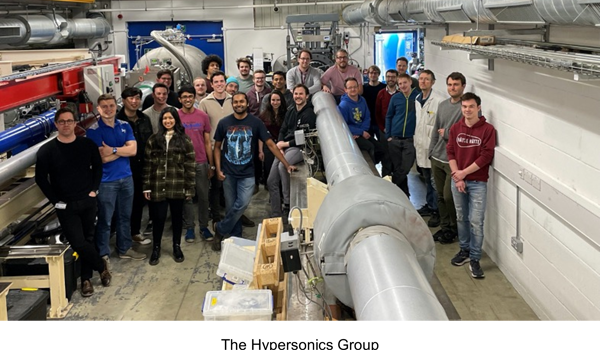17 Jan 2024
Thermofluids researchers offer projects as part of UNIQ+
Dr Luke Doherty and Dr Tobias Hermann are offering two of the Engineering projects for UNIQ +, which gives students from under-represented and disadvantaged backgrounds the opportunity to experience postgraduate study

Applications are now open for the University’s 2024 UNIQ+ postgraduate research internships.
UNIQ+ research internships are designed to provide students from under-represented and disadvantaged backgrounds who are ordinarily resident in the UK with the opportunity to experience postgraduate study.
UNIQ+ gives students the chance to experience life as a graduate research student at Oxford, gaining skills and experience that we hope will enhance both their CV and any future postgraduate applications. During the seven-week programme, which will run from Monday 1 July to Friday 16 August 2024, students will undertake a research project, attend training and information sessions, and have the opportunity to take part in social events.
Projects are available in a wide range of subjects - full list here. Two of the Engineering projects, provided by OTI researchers, are detailed below.
During the internship students will:
- receive a stipend of £3,000
- receive free accommodation in Oxford
- improve their research skills
- work with University of Oxford researchers
- receive advice on opportunities for further study and research careers
- enhance their ability to make a competitive application for postgraduate study
For full eligibility criteria, the full list of projects available, and to apply, visit the UNIQ+ website.
Applications close at 12:00 midday UK time on Wednesday 21 February 2024.
Experiments in a hypersonic wind tunnel
Supervisor Dr Tobias Hermann
Theme Aerospace and analytical techniques
Description
A new hypersonic wind tunnel is currently being built at the Oxford Thermofluids Institute that will allow the creation of air flows up to 5000 m/s velocity and is equipped with high-speed pressure sensors that record the flow at different locations within the facility. These flows can be used to experimentally simulate the conditions faced by hypersonic vehicles like the Space Shuttle or similar. You will help to implement a measurement chain for the pressure-sensors and to perform various experiments in the facility. The experiments will be used to characterise the performance and capability of the new wind tunnel. Your work on the project will include hands-on experimental work as well as data analysis of the measurement results. There is also an option to test an instrumented model of NASA’s planned Mars sample return mission in the new facility.
Outcomes
Your assistance on this project will result in benchmark conditions for the new facility which will be used in future scientific research on hypersonic and high-speed flow. During this process you will learn about fundamentals of high-speed flow physics and how measurement technology is applied for such extreme conditions. This is an opportunity for you to be part of a scientific group and to learn about adjacent projects that deal with high-speed flows, such as optical laser-diagnostics, plasma-flow heating etc. Results will be published at international conferences and in Journal articles.
Entry requirements
You should have enthusiasm and open-mindedness to learning new skills and getting involved with hands-on work. Whilst we are open to degrees outside the specific study area, as we will provide training for all necessary skills, you may find it beneficial if you have, or are studying, a degree in engineering, physics or maths.
Experimental hypersonic aerodynamics
Supervisor Dr Luke Doherty
Theme Aerospace and analytical techniques
Description
This project will be undertaken in the Oxford High Speed Wind Tunnels located at the Oxford Thermofluids Institute. These facilities are used to study fluid flows at speeds in excess of 1 km/s which are experienced by re-entry vehicles, meteoroids and demising satellites. You will contribute to ongoing experimental programs through analysis of data, design of experimental wind tunnels models, and the continued development and use of experimental techniques such as pressure sensitive paint, schlieren, infrared thermography and liquid crystal thermography. Your exact project tasks will be decided in discussion with your supervisor based on your interests and the needs of the wider research group.
Outcomes
You will be expected to learn the fundamentals of hypersonic flows, the working principles of the Oxford wind tunnels and the difficulties associated with ground testing at velocities in excess of 1 km/s. You will learn about the experimental techniques and advanced instrumentation that are used to investigate these flows, including the use of high-speed cameras capable of recording at up to 1 million frames per second.
Entry requirements
A relevant degree (or equivalent training) in engineering, physics or maths would be beneficial, however there are no specific entry requirements as necessary training will be provided. Some familiarity with data analysis (using Matlab/Python etc) will be useful.




